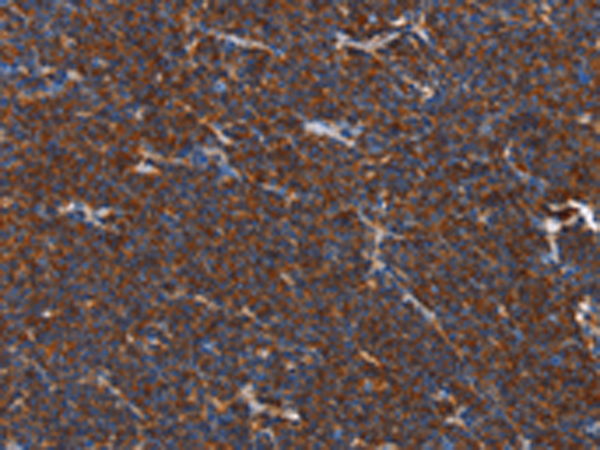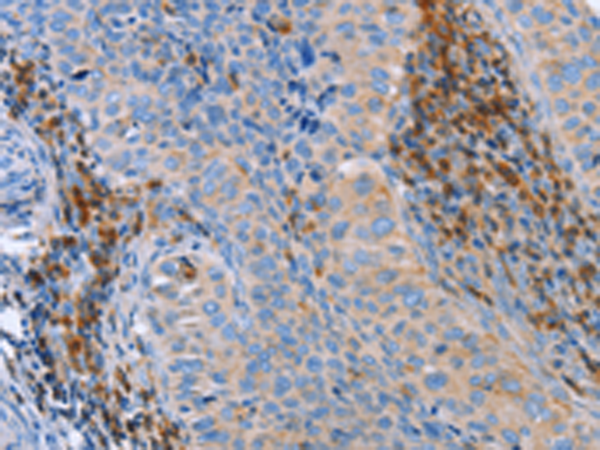

| WB | 咨询技术 | Human,Mouse,Rat |
| IF | 咨询技术 | Human,Mouse,Rat |
| IHC | 1/50-1/200 | Human,Mouse,Rat |
| ICC | 技术咨询 | Human,Mouse,Rat |
| FCM | 咨询技术 | Human,Mouse,Rat |
| Elisa | 1/1000-1/5000 | Human,Mouse,Rat |
| Aliases | CNK; FNK; PRK |
| Host/Isotype | Rabbit IgG |
| Antibody Type | Primary antibody |
| Storage | Store at 4°C short term. Aliquot and store at -20°C long term. Avoid freeze/thaw cycles. |
| Species Reactivity | Human, Mouse, Rat |
| Immunogen | Fusion protein of human PLK3 |
| Formulation | Purified antibody in PBS with 0.05% sodium azide and 50% glycerol. |
+ +
以下是3篇关于PLK3抗体的代表性文献(人工模拟摘要,仅供参考):
1. **文献名称**: "Polo-like kinase 3 regulates CtIP during DNA double-strand break repair"
**作者**: Li H, et al.
**摘要**: 该研究通过PLK3特异性抗体进行免疫共沉淀实验,揭示了PLK3通过磷酸化CtIP蛋白调控DNA双链断裂修复的分子机制,为癌症治疗提供新靶点。
2. **文献名称**: "PLK3 phosphorylates p53 to suppress tumorigenesis"
**作者**: Wang X, et al.
**摘要**: 研究利用PLK3抗体进行Western blot和免疫荧光分析,证实PLK3通过磷酸化p53蛋白增强其稳定性,从而抑制肿瘤发生发展。
3. **文献名称**: "PLK3 deficiency exacerbates tau pathology in Alzheimer's disease models"
**作者**: Miao Y, et al.
**摘要**: 通过PLK3抗体进行脑组织免疫组化检测,发现PLK3缺失会加剧阿尔茨海默病模型中tau蛋白过度磷酸化,提示其神经保护作用。
注:以上为基于领域知识的模拟文献,实际文献需通过PubMed/Google Scholar检索关键词"PLK3 antibody"或"PLK3 function"获取。近年研究多聚焦PLK3在癌症、神经疾病及DNA修复中的机制探索。
Polo-like kinase 3 (PLK3), a member of the Polo-like kinase family, plays critical roles in cell cycle regulation, DNA damage response, and tumor suppression. It is involved in checkpoint control during G2/M transition, mitotic progression, and stress-induced pathways such as apoptosis and autophagy. PLK3 contains a conserved N-terminal kinase domain and a C-terminal Polo-box domain (PBD), which mediates substrate interactions and subcellular localization. Dysregulation of PLK3 has been linked to cancer, neurodegenerative diseases, and cardiovascular disorders, with its expression often downregulated in tumors, suggesting tumor-suppressive functions.
PLK3 antibodies are essential tools for studying its expression, localization, and activity in cellular contexts. These antibodies are commonly used in techniques like Western blotting, immunofluorescence, and immunohistochemistry to detect endogenous PLK3 protein levels or post-translational modifications (e.g., phosphorylation). Specific monoclonal or polyclonal antibodies targeting distinct epitopes (e.g., kinase domain or PBD) enable researchers to investigate PLK3's interactions with substrates, such as p53 or CHK2. and its role in stress signaling pathways. Validated PLK3 antibodies are crucial for exploring its dual roles in promoting cell cycle arrest/apoptosis under stress and maintaining genomic stability, offering insights into therapeutic targeting in diseases like cancer.
×